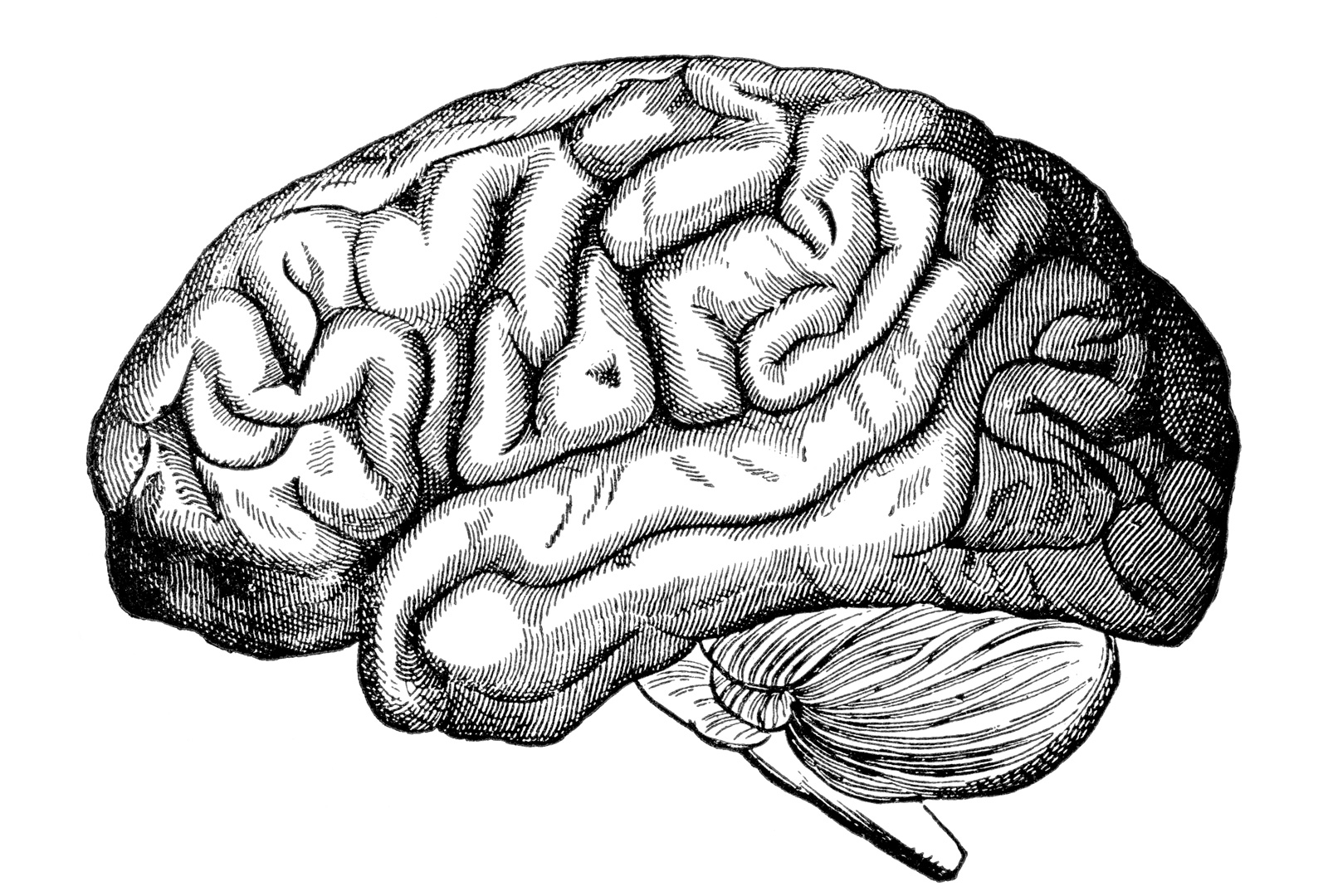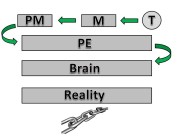Click here for part 1 and part 2

uh, I’m listening. Sorry, what?
Up to this point, my last two posts have tried to demonstrate a few key realizations:
- The brain is working primarily on an unconscious level. Because of this, we are rarely as aware of what we are doing and why as we would like to believe.
- The brain is well-intentioned and is trying to accomplish its sole purpose, surviving the moment.
- Because it is focused on surviving the moment, it will make decisions that favour short-term benefits EVERY SINGLE TIME, unless we override it.
- Because the brain operates primarily on the level of our unconscious, it usually communicates with our conscious brain indirectly. Often, it is trying to get our attention and we are not listening to it, which leads to the perpetuation of problem behaviors, thoughts, and feelings.
- If we learn to really listen to our brain, it will tell us everything we need to know.

This dude is valid, according to those who speak Latin.
The final piece of this trilogy will attempt to focus on the final point I’ve listed above. Specifically, I’m going to be demonstrating how working together with your brain, instead of fighting against it, is the surest way to mental health and a better experience of your existence. Let’s start with asking the question, “What is really listening?”
How do you know when someone has listened to you? Is it something that they have said? Was it because you were able to convince them of what you thought was right? Was it because they didn’t talk very much? Unfortunately, for many people, these are the standards that we insist upon in order for us to have felt listened to. However, these standards operate on a conscious level. Luckily, our brains, working on an unconscious level, are looking for something else and the brain knows it when it sees it. That something else is called validation.
The root of the word validate is valid, which, in its Latin origin, means strong. So when we talk of validating someone else, are we really saying that we are making them strong? In a sense, this is literally true. By validating someone else, you are giving them strength. In terms of truly listening to someone, this does not necessarily mean that we are giving their argument, position, or experience strength, but they are receiving strength from us as a fellow human being. How does this work?
 Let use an example. Lets say that you are discussing a decision with your significant other and a disagreement arises: where should we put the new couch? The discussion might go something like this:
Let use an example. Lets say that you are discussing a decision with your significant other and a disagreement arises: where should we put the new couch? The discussion might go something like this:
You: I think we should put it over here.
Them: I think we should put it on the other wall.
You: How am I supposed to see the TV if we put the couch on the other wall?
Them: If we put it where you want it, I guarantee it will just turn into another place to keep your piles of junk.
You: Junk? They’re called Pokemon cards and they are going to be worth a fortune some day!!
Them: Fine. Watch TV and play cards. I’m going to bed.
So, you got your way, they stopped talking, but were you listened to? Did you listen to them? Do you really want to make Pokemon a priority in your life? (Sorry, I had to slip that last one in). Does either person leave that conversation feeling better about themselves or the relationship? Is either person left with a lasting increase in strength? I think the answers to all of these questions is an obvious “No”.
While you got your way, it was through a combination of bullying, whining, and the other person’s learned helplessness. You got to feel powerful for a short time (the moment) but in the long run, you have set your relationship up for further difficulty. The brain, in its desperate attempt to help you survive the moment, has shortchanged your future.
So how does validating work? How would the conversation be different if both parties used this skill? The conversation might go more like this:
You: I think we should put it over here.
Them: Hmmm. Why do you want to put it there?
You: Well, I like to be able to lay on the couch and watch TV. If we put it over there, I won’t be able to do that.
Them: OK, so for you, the main purpose of the couch is to watch TV comfortably? Is that right?
You: Totally. What about you?
Them: Well, I like to visit with our friends and I think having a couch in the right place really makes that easier.
You: OK…

I know a guy with a spare couch…
Them: My concern is that if we put it over there, then when our friends are over, everyone will just end up watching TV instead of chatting. Does that make sense to you?
You: I guess so. So it’s not just about where to put the couch, but its really about what purpose we have in mind for the couch.
Them: Seems that way
You: OK, maybe we need to talk about this some more
Them: Great. I love you. And I love Pokemon!!
OK, I realize it had a bit of a Saved by the Bell ending there, but the point is illustrated. When we validate the other person’s position, we demonstrate to them that we are listening, that we consider their experience to be important, and that we are attempting to connect with them in a meaningful way. We are NOT demonstrating that we agree with them.

Um, I think you missed a button.
In the first dialogue, each person presented their position without demonstrating the least bit of effort to reach out to the other. This resulted in each party rallying to their unconscious defenses, arguing and insulting each other until short term survival of the moment was achieved.
In the second dialogue, instead of immediately offering a counterproposal for the couch position, the partner took the time to listen to your reasons for your idea. By doing this, the partner was saying that your ideas are important and by extension, so are you. Because of this message, your unconscious defenses were able to rest a bit easier, allowing you to feel comfortable sharing some of your thoughts and feelings and also created an atmosphere in which neither person felt threatened.
OK, so that’s validating in action. I could go on (and on and on and on) for a long time, just discussing the nuances of validation and listening but the real reason for all of this preamble is to demonstrate how our brain wants the same thing as our partner. Lets get to the point here, how do we validate our brain and what is the result?
If you remember, at the beginning of this journey, I mentioned the idea that you are not your brain. This is where taking that idea literally can come in really handy. Think of your brain as you would another person, a separate entity with its own desires and priorities. As we now know, the brain does, in fact, have different priorities than we do, just as the two individuals in the award-winning dialogue discovered that they had different priorities. Your priorities are to be happy and get the most you can out of your existence (I hope). Your brain’s priority is to survive this moment with the least amount of effort possible. We can see where this marriage is going to run into some problems.
What if you were to engage in a literal dialogue with your brain, as if it were another person, and use the validation skills you now possess? How would that conversation go?
Your Brain: Quick! Scream and yell! Insult him! Take control of the situation!
You: Wow, you seem really upset. What’s going on?
Your Brain: We’re going to die!!
You: Really? That doesn’t sound too good.
Your Brain: Death is imminent! We must survive!!
You: Where did you get the idea that we’re going to die?
Your Brain: He’s going to leave us! He doesn’t care! We’re going to be all alone! We can’t take care of ourselves, we are only children!
You: Ahh, I see. So, when he says that he disagrees with me, this triggers some sort of fearful memory for you?
Your Brain: Absolutely! It’s just like when the teacher pointed to your spelling test in front of the class and made fun of your grade!
You: How is it like that?
Your Brain: He thinks you’re stupid! That’s why he disagrees with you! He’s saying you’re stupid! If you’re stupid, then you are worthless and no one will ever care about you and you will be alone and you won’t be able to take care of yourself because you’re only a child!
You: I see. So you think that when he disagrees with me, he’s really saying that I’m worthless and that because of that, I will end up alone and not be able to take care of myself.
Your Brain: Of course not. You’re only a child.
You: OK, I can see why you would think that. On the level of consciousness that you operate, the similarity between this situation and past experiences of humiliation and rejection from important figures in my life has tricked you into thinking that I’m only a small child. On top of that, because you think I’m a little child, you think that rejection by those in a position of caregiving is literally a life or death matter. That makes sense. If you really do believe that I’m going to die, it makes sense why you would react so strongly.
Your Brain: Yes… wait, what do you mean tricked?
You: Well, I know that this situation seems very similar but if you look around, you will see that he is not my teacher or my caregiver, he’s my co-worker.
Your Brain: Oh.. OK

I think this means things are getting better. Or I’m having a heart attack.
You: You will also notice that I am not a small child, but a grown adult, fully capable of taking care of myself.
Your Brain: Oh… I see.
You: In other words, this is not that. He is not them. Now is not then. I’m not going to die.
Your Brain: Are you sure?
You: Pretty sure…
Your Brain: OK, well, let me know if you need any hasty survival-based decisions made.
Now, that may seem a bit cheesy but I assure you that having this dialogue with your brain will work wonders. Initially, these conversations will happen almost exclusively after-the-fact. You will have reacted in a way that you regret and you will be trying to figure out why it happened. This conversation will refer to events in the past tense.
Your brain will not be so easily dissuaded. Remember, it thinks it is fighting for your survival, it will be persistent in insisting on its version of events. However, if you continue to validate its experience, it will gradually reduce the use of its defenses and it will begin to listen to your side of the story. This will not happen in an evening. Change of this magnitude is a process, not an event.

We’re proud of you guys!! Way to go Bayside Tigers!! Yeah.
The best way to get someone to lower their defenses and to trust you is to demonstrate that even though your worldview is different than theirs, you still find theirs just as important and you want to understand it better. Reaching out to others in this way, whether another human being or your own brain, will allow both parties to get down to the gist of their experience and work together to come up with a solution that works for everyone.
Now that’s something that Zack, Slater, Kelly, Screech, Lisa, Jessie, and good old Mr. Belding would be proud of.
OK fine, here’s a little Bayside Bonus for ya!!


















































Recent Comments